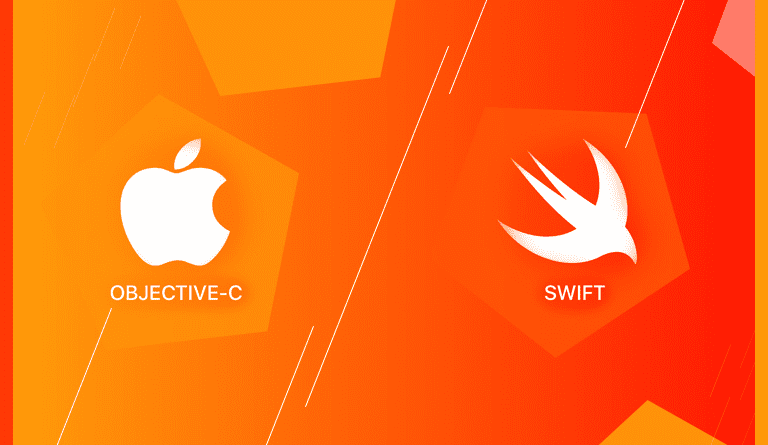Apple App Store came in 2008, with not so significant numbers of apps to download from. As popularity increased, the number of apps turned to millions in no time.
This custom ios application development has mainly been carried out with Swift or Objective-C. They have always been in the buzz to develop applications to meet growing end-consumer demands and a streamlined course of action for developing flawless iOS applications.
Despite such popularity and preference, there’s always a debate going on about which one is better between Swift and Objective-C for iOS app development.
That’s the issue that we will be addressing in this article ahead. We will shed some light on the difference between Swift and Objective-C, along with some common questions that are awaiting answers.
So, without waiting any further, let’s dive into the details.
Swift vs. Objective-C: Who is Better?
If we talk about the solutions for iOS app development, Swift is relatively more famous. It acts as a general-purpose and multi-paradigm language for coding for several Apple devices such as iOS, Watch OS, etc. Swift has been designed with the intent to make it easy-to-learn language, and the development process quick and simple to be implemented.
On the other hand, Objective-C is an old and long-running programming language. It’s a general-purpose and object-oriented programming language that is known for the iOS suite of products.
Here are the advantages of each for iOS application development:
Advantages of Swift
Swift came into being in 2014, which makes it a newcomer in the league.
There are multiple reasons associated with its fame and demand.
- Swift comes with a wide array of tools. One very known out of so many is the Playground by Apple. It is like a proxy for an Integrated Development Environment (IDE); all you need is a developer account with Apple to initiate coding and compiling your code without setting up an IDE.
- Swift, being an open-source language, facilitates advanced learning even for ones at the beginner level.
- Swift also arrives with the Swift Package Manager, integrated with the Swift build system. This assists in taking care of the intricacies. Apple is continually making efforts for the introduction of utilities and auxiliary components to keep the development process streamline and interesting always.
- Another advantage of Swift includes allowing static typing and optional fields. What you do is code with the specific type. You then use the same for defining a variable in the code.
- Swift is also very famous for its syntax. It is not bound to the use of additional characters like semicolons, parentheses, etc. The coding with Swift is more readable, neat, and easy.
Advantages of Objective-C
Objective-C has been in the race even before Swift. There is no doubt about its advantages if we still have it as an option. There are many of its benefits that make it a preferred choice among developers.
- Objective-C is object-oriented and dynamic in the nature programming language. It permits the objects to send messages to other objects during runtime. This signifies not just higher run-time adaptability but accessibility to private APIs as well.
- Objective-C has been there for iOS app development for a long time. This makes it a stable programming language that leaves almost no or minimal scope for the bugs.
- Objective-C is a superset of C, which makes it compatible with the libraries of C and C++. If you know and have experience in C or C++, coding in Objective-C becomes easier. You can also use third-party C and C++ libraries with Objective-C.
Swift vs. Objective-C: Common Questions
Being such a common topic of debate, there are many questions associated with the use of Swift and Objective-C. Here are some common ones addressed with their answers.
How are Swift and Objective-C different?
On the most common grounds of differentiation, Objective-C is based out of C language. It is quite hard to use.
Swift, on the contrary, is easy to learn and work with. Swift supports interactive coding.
Which one is faster?
As per Apple’s website, Swift is significantly, i.e., 2.6 times faster than Objective-C. However, in practical terms, both Swift and Objective-C are languages that are typed statistically and use the same iOS SDK.
Which one is better?
While learning Swift is simple, Objective C is more grounded and stable as a permanent fixture. Swift has less coding, while Objective-C needs more lines of code for the same purpose. Here, Swift wins the situation by saving time and effort.
The Bottom Line
The rising demand for iOS app development makes it essential to bring the best and most suitable technology to use.?
However, concluding that one is better than the other is never possible. Both Swift and Objective-C are useful and effective in their own ways. The decision then depends upon the complexity of your project.
Make sure to make a wise decision based on all necessary parameters for prolific results!

As the editor of the blog, She curate insightful content that sparks curiosity and fosters learning. With a passion for storytelling and a keen eye for detail, she strive to bring diverse perspectives and engaging narratives to readers, ensuring every piece informs, inspires, and enriches.










